Continuously updated
Reference Discs
When evaluating audio components, the SoundStage!
writers rely on key recordings to help them assess performance characteristics. The
purpose of this column is to give readers insight into this process by showing a subset of
the recordings used and explaining briefly what writers listen for when using them.
Each of the recordings listed should be readily
available in most good music stores. This list of recordings will be added to and deleted
from on an ongoing basis as our reviewers' preferences change.
Art Blakely, Dr. John, David
"Fathead" Newman: Bluesiana Triangle
Wyndham Hill Jazz WD-0125
Format: CD
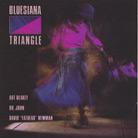 This aptly named 1990
recording is a bluesy, jazzy collection featuring some of jazz’s most prominent
contemporary musicians. The disc is very well recorded, as most Wyndham Hill releases are,
and has prodigious low- and high-frequency extension with which to gauge a system’s
tonality. The third track, "Shoo Fly Don’t Bother Me," features an
extended drum solo that has all the shimmer of high hats and the snap of Pearls, enabling
the listener to immerse in the moment. With the right system, the sound of the wooden
sticks slapping the Zildjians should be easily discernable, as should the transient attack
and punch of the drums. My reference preamp portrays this trio with all the immediacy and
presence of a live performance, yet an older and equally respected preamp does not. It was
immediately apparent that the latter masked the dynamics that would otherwise lend
credibility to the image specificity. "For All We Know" ranks among the most
articulate presentations of male vocals I have ever heard. It is an excellent test of
midrange accuracy and palpability, and it is a good tool for unearthing sibilance....Mack
Khan
This aptly named 1990
recording is a bluesy, jazzy collection featuring some of jazz’s most prominent
contemporary musicians. The disc is very well recorded, as most Wyndham Hill releases are,
and has prodigious low- and high-frequency extension with which to gauge a system’s
tonality. The third track, "Shoo Fly Don’t Bother Me," features an
extended drum solo that has all the shimmer of high hats and the snap of Pearls, enabling
the listener to immerse in the moment. With the right system, the sound of the wooden
sticks slapping the Zildjians should be easily discernable, as should the transient attack
and punch of the drums. My reference preamp portrays this trio with all the immediacy and
presence of a live performance, yet an older and equally respected preamp does not. It was
immediately apparent that the latter masked the dynamics that would otherwise lend
credibility to the image specificity. "For All We Know" ranks among the most
articulate presentations of male vocals I have ever heard. It is an excellent test of
midrange accuracy and palpability, and it is a good tool for unearthing sibilance....Mack
Khan
Blood, Sweat & Tears: Blood, Sweat
& Tears 3
Mobile Fidelity MFSL UDSACD 2013
Format: Hybrid SACD
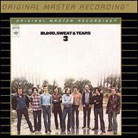 Another of those "I like it and it
sounds good too" discs that seem to dot my collection., Blood, Sweat & Tears 3
is the least known of B,S&T's first three albums, but it contains some of the band's
best musical efforts and has the most realistic sonics. I mainly drop this album into my
SACD player when I am considering two things: soundstaging and dynamics. On the first cut,
"Hi-De-Ho," the song ends with lead singer David Clayton Thomas being joined by
the Manhattan Borough-Wide Chorus for the Friends of Music of New York. The chorus is
spread out behind Thomas and was so clearly recorded that you should be able to pick out
individual voices and hear how far back the chorus is standing. The last cut,
Stevie Winwood’s "40,000 Headmen," goes right to the heart of dynamics. The
song starts off slowly and quietly, then -- boom! -- the band comes blazing in. When they
run through the two choruses of Monk’s "Well, You Needn’t," the sound
should blow you out of your seat. Combine all this with MFSL’s superb transfer, and
you have a disc that holds pride of place in my music collection....John Crossett
Another of those "I like it and it
sounds good too" discs that seem to dot my collection., Blood, Sweat & Tears 3
is the least known of B,S&T's first three albums, but it contains some of the band's
best musical efforts and has the most realistic sonics. I mainly drop this album into my
SACD player when I am considering two things: soundstaging and dynamics. On the first cut,
"Hi-De-Ho," the song ends with lead singer David Clayton Thomas being joined by
the Manhattan Borough-Wide Chorus for the Friends of Music of New York. The chorus is
spread out behind Thomas and was so clearly recorded that you should be able to pick out
individual voices and hear how far back the chorus is standing. The last cut,
Stevie Winwood’s "40,000 Headmen," goes right to the heart of dynamics. The
song starts off slowly and quietly, then -- boom! -- the band comes blazing in. When they
run through the two choruses of Monk’s "Well, You Needn’t," the sound
should blow you out of your seat. Combine all this with MFSL’s superb transfer, and
you have a disc that holds pride of place in my music collection....John Crossett
Eva Cassidy: Live At Blues Alley
Blix Street G2-10046
Format: CD
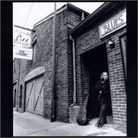 Sometimes reference
recordings don’t have the very best sound, but instead have other attributes that
make them useful in evaluating systems and enjoyable to listen to. Live At Blues Alley
is just such an album. Cassidy's vocals are well recorded but slightly veiled, and there
is the occasional bit of sibilance. The instrumentation is exceedingly simple, but very
high-resolution systems will extract the subtle nuances of Cassidy's soulful vocals that
will allow you to connect with her and her music. Everyone’s favorite cut from this
album will be "Fields of Gold," and for good reason, but there are other gems
such as "What A Wonderful World" and "People Get Ready" that are
equally as rewarding. This straightforward recording will sound good on even fairly modest
systems, but the vocals will truly come alive with breathtaking quality on more
accomplished systems….Roger Kanno
Sometimes reference
recordings don’t have the very best sound, but instead have other attributes that
make them useful in evaluating systems and enjoyable to listen to. Live At Blues Alley
is just such an album. Cassidy's vocals are well recorded but slightly veiled, and there
is the occasional bit of sibilance. The instrumentation is exceedingly simple, but very
high-resolution systems will extract the subtle nuances of Cassidy's soulful vocals that
will allow you to connect with her and her music. Everyone’s favorite cut from this
album will be "Fields of Gold," and for good reason, but there are other gems
such as "What A Wonderful World" and "People Get Ready" that are
equally as rewarding. This straightforward recording will sound good on even fairly modest
systems, but the vocals will truly come alive with breathtaking quality on more
accomplished systems….Roger Kanno
Jesse Cook: Gravity
Narada Equinox 08361-63037-2-7
Format: CD
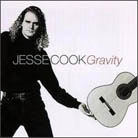 Jesse Cook’s Gravity
is a one of my favorites for a number of reasons. First and foremost is the rhythmically
dense layering of the various instruments. This dense melange of rhythm is a true
challenge for a system to unravel and present in a fashion that doesn’t become a
smeared mass of strings, skins, blocks and sticks. Musically, the various tracks are a
brilliant combination of various musical styles, all propelled by Cook’s captivating
ability to really play the guitar. A particular favorite is "Into the
Dark," which starts with the guitar gently playing and hanging in space just to the
left of center; soon afterward the bass joins in with a solid underpinning, taut and
smooth. "Brio" offers some fine rim shots and solid bass lines. Many may be
familiar with either "Mario Takes A Walk" or "Gipsy" as these are
sometimes used in showrooms to demonstrate equipment. Both are great; the bass track on
"Mario" in particular grooves along nicely. Narada used 20-bit mastering for
this title and it shows. Gravity is one of those CDs that when everything is
really "working right" you just end up listening to it in its entirety....David
Dowdell
Jesse Cook’s Gravity
is a one of my favorites for a number of reasons. First and foremost is the rhythmically
dense layering of the various instruments. This dense melange of rhythm is a true
challenge for a system to unravel and present in a fashion that doesn’t become a
smeared mass of strings, skins, blocks and sticks. Musically, the various tracks are a
brilliant combination of various musical styles, all propelled by Cook’s captivating
ability to really play the guitar. A particular favorite is "Into the
Dark," which starts with the guitar gently playing and hanging in space just to the
left of center; soon afterward the bass joins in with a solid underpinning, taut and
smooth. "Brio" offers some fine rim shots and solid bass lines. Many may be
familiar with either "Mario Takes A Walk" or "Gipsy" as these are
sometimes used in showrooms to demonstrate equipment. Both are great; the bass track on
"Mario" in particular grooves along nicely. Narada used 20-bit mastering for
this title and it shows. Gravity is one of those CDs that when everything is
really "working right" you just end up listening to it in its entirety....David
Dowdell
Daboa: from the gekko
Triple Earth trecd 115
Format: CD
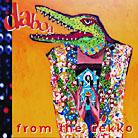 I usually take
this CD to shows to audition equipment in various rooms. The response from manufacturers
and others in the rooms has always been amazing. I’ve
never played anything that has gotten so many “What the heck is that?” inquiries. I was giving out information
on this CD so often that I toyed with the idea of making a business card for the CD
that I could hand out. Daboa mixes pop, folk, and world music. The instrumental and
production talents of Frank Harris underscore the sultry Latin vocals of Maria Marquez.
Lyrics are a mix of English, Spanish and Portuguese. The music is mostly synthesized, but
it isn’t “synthesizer music.” Atmospheres are created in your listening
room -- a jungle village with birds flying and kids playing, jewel-tone bells filling the
room, fast-running water in a stream, the Dalai Lama joyously saying, “I feel much
better.” These "songs" have to be heard to be believed. This disc will
exercise your system from the deepest bass to the highest highs. The bad news is that this
disc is harder than heck to find in the US because it was released on the small UK Triple
Earth label. Your best source is probably www.amazon.co.uk, the U.K. version of the original US-based
Amazon.com....Doug Blackburn
I usually take
this CD to shows to audition equipment in various rooms. The response from manufacturers
and others in the rooms has always been amazing. I’ve
never played anything that has gotten so many “What the heck is that?” inquiries. I was giving out information
on this CD so often that I toyed with the idea of making a business card for the CD
that I could hand out. Daboa mixes pop, folk, and world music. The instrumental and
production talents of Frank Harris underscore the sultry Latin vocals of Maria Marquez.
Lyrics are a mix of English, Spanish and Portuguese. The music is mostly synthesized, but
it isn’t “synthesizer music.” Atmospheres are created in your listening
room -- a jungle village with birds flying and kids playing, jewel-tone bells filling the
room, fast-running water in a stream, the Dalai Lama joyously saying, “I feel much
better.” These "songs" have to be heard to be believed. This disc will
exercise your system from the deepest bass to the highest highs. The bad news is that this
disc is harder than heck to find in the US because it was released on the small UK Triple
Earth label. Your best source is probably www.amazon.co.uk, the U.K. version of the original US-based
Amazon.com....Doug Blackburn
Die Röhre - The Tube
Tacet 74
Format: CD or LP
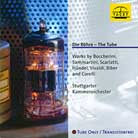 Oh my. Oh my, my. I have
never been as awed by a recording as I was the first time I heard this disc. Recorded
completely on rebuilt 1940s and 1950s tube equipment (including the microphones), this is
a collection of Baroque music performed by the Stuttgart Chamber Orchestra. The nuance of
each instrument is remarkable. You will not hear strings that have been recorded as well
as this. Soundstaging and imaging are impeccable. Often it seems like the life is missing
when listening to recorded classical music. Not so here. I have compared the vinyl with
the CD, and my suggestion is to buy both. Yes, the vinyl is better, but it makes for great
comparison and both are excellent. The performances are as inspired as the recording.
Sonics, material, performances -- a complete package if there ever was one....Bill
Brooks
Oh my. Oh my, my. I have
never been as awed by a recording as I was the first time I heard this disc. Recorded
completely on rebuilt 1940s and 1950s tube equipment (including the microphones), this is
a collection of Baroque music performed by the Stuttgart Chamber Orchestra. The nuance of
each instrument is remarkable. You will not hear strings that have been recorded as well
as this. Soundstaging and imaging are impeccable. Often it seems like the life is missing
when listening to recorded classical music. Not so here. I have compared the vinyl with
the CD, and my suggestion is to buy both. Yes, the vinyl is better, but it makes for great
comparison and both are excellent. The performances are as inspired as the recording.
Sonics, material, performances -- a complete package if there ever was one....Bill
Brooks
Ani DiFranco: Up Up Up Up Up Up
Righteous Babe Records RBR013-D
Format: CD
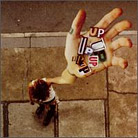 This is an album
that successfully mixes folk, pop, jazz, and funk elements. Like many of DiFranco’s
albums, this one features outstanding sound that allows for critical evaluation of female
vocal reproduction as well as acoustic instruments such as guitar and drums. More than
that, though, Up Up Up Up Up Up has outstanding soundstage information that shows
whether a system can image well laterally, and also whether it can render a sense of
depth. "Virtue," for example, has percussion placed far to the left and way back
in the stage. It should sound stable, just inside the left speaker, and very far back --
say, 15 to 20 feet. With "Everest," DiFranco’s voice is placed distinctly
left of the stage, just to the right of the left speaker. The voice should emanate in a
rock-solid space and have excellent tonal qualities and weight. With speakers that render
depth well, the voice may sound like it’s coming from one or so feet behind the
speaker plane. These are just a couple of key elements in this excellent disc….Doug
Schneider
This is an album
that successfully mixes folk, pop, jazz, and funk elements. Like many of DiFranco’s
albums, this one features outstanding sound that allows for critical evaluation of female
vocal reproduction as well as acoustic instruments such as guitar and drums. More than
that, though, Up Up Up Up Up Up has outstanding soundstage information that shows
whether a system can image well laterally, and also whether it can render a sense of
depth. "Virtue," for example, has percussion placed far to the left and way back
in the stage. It should sound stable, just inside the left speaker, and very far back --
say, 15 to 20 feet. With "Everest," DiFranco’s voice is placed distinctly
left of the stage, just to the right of the left speaker. The voice should emanate in a
rock-solid space and have excellent tonal qualities and weight. With speakers that render
depth well, the voice may sound like it’s coming from one or so feet behind the
speaker plane. These are just a couple of key elements in this excellent disc….Doug
Schneider
Dave Grusin,
Lee Ritenour, Diane Schuur, Larry Williams: GRP Live In Session
GRP GRP-D-9532
Format: CD
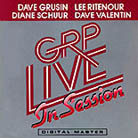 I don’t know if this music is
rightfully called modern jazz or jazz fusion; that’s for the music critics to sort
out. But it’s great music, and a great live recording of a studio concert as
performed by a band consisting of the GRP label’s hottest stars. It has the
spontaneity and energy level of a live recording with the total control over sonics of a
studio piece. Other than the great music, the reasons I play it over a new system are
numerous: each cut spotlights a different instrument -- piano, guitar, various wind
instruments -- or the human voice (Diane Schuur's voice, that is), so I get a sense of a
range by which I can judge instrumental timbre. But it’s the drums that I most often
come to this disc for -- fabulously, cleanly, and closely miked drums. The drum kit by
itself is a microcosm of references: deep and powerful bass drum and floor-toms (all with
incredible heft), shimmering cymbals, and a kaleidoscope of timbres, tones and colors in
between them -- all rendered fast and furious. And making matters even more interesting is
the imaging involved. No, a drum kit that extends from speaker to speaker isn’t
entirely natural, but you gotta hear the drum-roll performed on two different drums
to experience how it images between your speakers....John Potis
I don’t know if this music is
rightfully called modern jazz or jazz fusion; that’s for the music critics to sort
out. But it’s great music, and a great live recording of a studio concert as
performed by a band consisting of the GRP label’s hottest stars. It has the
spontaneity and energy level of a live recording with the total control over sonics of a
studio piece. Other than the great music, the reasons I play it over a new system are
numerous: each cut spotlights a different instrument -- piano, guitar, various wind
instruments -- or the human voice (Diane Schuur's voice, that is), so I get a sense of a
range by which I can judge instrumental timbre. But it’s the drums that I most often
come to this disc for -- fabulously, cleanly, and closely miked drums. The drum kit by
itself is a microcosm of references: deep and powerful bass drum and floor-toms (all with
incredible heft), shimmering cymbals, and a kaleidoscope of timbres, tones and colors in
between them -- all rendered fast and furious. And making matters even more interesting is
the imaging involved. No, a drum kit that extends from speaker to speaker isn’t
entirely natural, but you gotta hear the drum-roll performed on two different drums
to experience how it images between your speakers....John Potis
Jerome Harris
Quintet: Rendezvous: The Jerome Harris Quintet Plays Jazz
Stereophile STPH013-2 CD
Format: CD
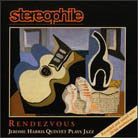 This 1999 recording
features an incredible range of timbres and musical textures. It has an ungodly dynamic
range -- it'll sound soft at your normal listening level, but when this band gets going,
watch out! Listen for the air around the drums. This collection was recorded in a
converted church, so it's a big room and the sound of the antique Zildjians takes
forever to decay. Then check out "The Mooche" for Art Baron's trombone. When he
gets blowing, the sound is practically a square wave and it should sound rude and blatty
-- if it sounds smooth or mellow, your system's colored. And last, listen to Jerome
Harris' acoustic bass guitar. If it sounds full and round and prominent in the mix, your
speakers (or your room) are over-emphasizing the bass. To my everlasting shame, I didn't
use my producer's prerogative to boost the bass in the final mix. As a result, I always
feel as if I have to strain to hear Jerome Harris' remarkable playing on what is, after
all, his showcase....Wes Phillips
This 1999 recording
features an incredible range of timbres and musical textures. It has an ungodly dynamic
range -- it'll sound soft at your normal listening level, but when this band gets going,
watch out! Listen for the air around the drums. This collection was recorded in a
converted church, so it's a big room and the sound of the antique Zildjians takes
forever to decay. Then check out "The Mooche" for Art Baron's trombone. When he
gets blowing, the sound is practically a square wave and it should sound rude and blatty
-- if it sounds smooth or mellow, your system's colored. And last, listen to Jerome
Harris' acoustic bass guitar. If it sounds full and round and prominent in the mix, your
speakers (or your room) are over-emphasizing the bass. To my everlasting shame, I didn't
use my producer's prerogative to boost the bass in the final mix. As a result, I always
feel as if I have to strain to hear Jerome Harris' remarkable playing on what is, after
all, his showcase....Wes Phillips
Carol Kidd: Carol
Kidd
Aloi Records AKH CD 003
Format: CD and LP
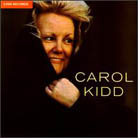 This was Carol Kidd's first
recording for Linn's Aloi Records label, and it was a benchmark for me then on vinyl. It
remains so today on both LP and CD. This collection of standards is beautifully recorded,
and is my standard for female vocals. Both piano and vocals get two thumbs up for
naturalness, in both timbre and perspective. The CD transfer is particularly well done,
and it sacrifices little to the original vinyl release. The opening track, "Then
I’ll be Tired of You," has Kidd’s voice deftly placed midpoint and slightly
set back, almost sounding like she’s coming from my center-channel speaker! The piano
is super natural and full of wonderful overtones and harmonics. A particular favorite for
me is "Waltz for Debbie." The bass guitar and drums are well presented, and this
disc has some of the nicest sounding cymbals I’ve heard....David Dowdell
This was Carol Kidd's first
recording for Linn's Aloi Records label, and it was a benchmark for me then on vinyl. It
remains so today on both LP and CD. This collection of standards is beautifully recorded,
and is my standard for female vocals. Both piano and vocals get two thumbs up for
naturalness, in both timbre and perspective. The CD transfer is particularly well done,
and it sacrifices little to the original vinyl release. The opening track, "Then
I’ll be Tired of You," has Kidd’s voice deftly placed midpoint and slightly
set back, almost sounding like she’s coming from my center-channel speaker! The piano
is super natural and full of wonderful overtones and harmonics. A particular favorite for
me is "Waltz for Debbie." The bass guitar and drums are well presented, and this
disc has some of the nicest sounding cymbals I’ve heard....David Dowdell
Patty Larkin: Regrooving the Dream
Vanguard Records 79552-2
Format: CD
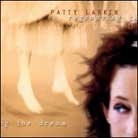 You’ll find
Patty Larkin in the folk section, although I have no idea how they classify her so easily.
Listening to this CD is like taking a trip across a diverse landscape. The ride is always
enjoyable, but always changing. As a reference disc, its uses are also quite varied. For
soundstage width, check out "The River." There is a haunting guitar chord that
decays into tomorrow. With the right system it will reach around behind you and raise the
hairs on your neck. Depth and imaging are also excellent. For microdynamics, I always like
acoustic guitar. On the short track "Hand Full of Water," you can almost name
the brand of strings. For sorting out some serious speed and complexity, there is nothing
like the blistering drum and guitar solo on "When." Only the bravest of systems
can hold this together. All this and incredible female vocals to boot make this disc one
fine trip on a system that has what it takes....Bill Brooks
You’ll find
Patty Larkin in the folk section, although I have no idea how they classify her so easily.
Listening to this CD is like taking a trip across a diverse landscape. The ride is always
enjoyable, but always changing. As a reference disc, its uses are also quite varied. For
soundstage width, check out "The River." There is a haunting guitar chord that
decays into tomorrow. With the right system it will reach around behind you and raise the
hairs on your neck. Depth and imaging are also excellent. For microdynamics, I always like
acoustic guitar. On the short track "Hand Full of Water," you can almost name
the brand of strings. For sorting out some serious speed and complexity, there is nothing
like the blistering drum and guitar solo on "When." Only the bravest of systems
can hold this together. All this and incredible female vocals to boot make this disc one
fine trip on a system that has what it takes....Bill Brooks
Mahler: Symphony
No. 3
New York Philharmonic; Christa Ludwig, contralto solo; New York Choral Artists; Brooklyn
Boys Chorus; Leonard Bernstein, conducting
Deutsche Grammophone DG 427 328-2
Format: CD
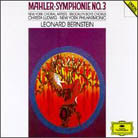 From its mighty brass opening to the
extended shimmer of its last notes, this is a performance that emphasizes tonal color and
drama. The one thing about the NYP you could always count on was that they'd play their
hearts out for Lenny. And here they did. They didn't just play Mahler's Third as if it
meant something, they played it as though it meant everything. Maybe it does.
From its mighty brass opening to the
extended shimmer of its last notes, this is a performance that emphasizes tonal color and
drama. The one thing about the NYP you could always count on was that they'd play their
hearts out for Lenny. And here they did. They didn't just play Mahler's Third as if it
meant something, they played it as though it meant everything. Maybe it does.
This set has demo quality dynamics -- and I don't
just mean the massed crescendos. The quiet sections are high drama at its best, and the
orchestral colors and textures are about as vivid and powerful as anything ever recorded.
But if it were only a good-sounding record, it would stay on the shelves with the other
pretty records. This is Lenny at his absolute best, caring so deeply about the music that
you hear it the way he does. And that's not something to take lightly....Wes Phillips
Dave Matthews Band: Crash
RCA 07863 66904-2
Format: CD
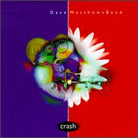 When you see the Dave
Mathews Band live, you just have to become a fan. I remember seeing them while in college
several times, and man is it fun! Crash captures a lot of the live energy in a
studio recording that has some interesting attributes. The tune that was just made to test
transient attack, midbass punch, and complex renderings is "Say Goodbye." The
drum solo during the first 45 seconds is amazingly clear, and it throws a huge soundstage.
Your speakers will have to react fast and furiously, and if you can’t feel the
kick drum, you know you have a problem. When Matthews gets into the mix, you will hear a
properly scaled center image while everyone else is just jamming. There is a lot going on
here, making it a busy song, but this will put a good system to the test….Jeff
Fritz
When you see the Dave
Mathews Band live, you just have to become a fan. I remember seeing them while in college
several times, and man is it fun! Crash captures a lot of the live energy in a
studio recording that has some interesting attributes. The tune that was just made to test
transient attack, midbass punch, and complex renderings is "Say Goodbye." The
drum solo during the first 45 seconds is amazingly clear, and it throws a huge soundstage.
Your speakers will have to react fast and furiously, and if you can’t feel the
kick drum, you know you have a problem. When Matthews gets into the mix, you will hear a
properly scaled center image while everyone else is just jamming. There is a lot going on
here, making it a busy song, but this will put a good system to the test….Jeff
Fritz
Andy McCloud and the Gentlemen of Jazz: Blues
For Bighead
Mapleshade 07832
Format: CD
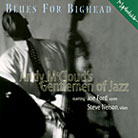 I turn to this disc time and
again during any of my reviews for a number of reasons, not the least of which is that I
simply enjoy the music. McCloud on acoustic bass, Joe Ford on alto and soprano saxophones,
Steve Nelson on vibes, and Victor Jones on drums play some wonderful straight-ahead hard
bop. Recorded live at Pierre Sprey’s Maryland home/studio to Mapleshade’s
exacting standards, the instruments are spooky real in both their presence and tonal
balance. Space is at a premium as well. Sitting back with my eyes closed, playing the
first track via the right equipment, I hear the image of four musicians standing (or, in
Jones's case, sitting) in front of me. The sensation transcends the label
"reproduction" and causes me to grin from ear to ear. Nelson’s vibes should
shimmer; Lewis’ drumheads should snap, crackle and pop; his cymbals should crackle
like struck brass; and the sound of McCloud’s bass should come across as all too real
when he plucks the strings and excites that large wooden cavity. Jazz fans will love this
CD....John Crossett
I turn to this disc time and
again during any of my reviews for a number of reasons, not the least of which is that I
simply enjoy the music. McCloud on acoustic bass, Joe Ford on alto and soprano saxophones,
Steve Nelson on vibes, and Victor Jones on drums play some wonderful straight-ahead hard
bop. Recorded live at Pierre Sprey’s Maryland home/studio to Mapleshade’s
exacting standards, the instruments are spooky real in both their presence and tonal
balance. Space is at a premium as well. Sitting back with my eyes closed, playing the
first track via the right equipment, I hear the image of four musicians standing (or, in
Jones's case, sitting) in front of me. The sensation transcends the label
"reproduction" and causes me to grin from ear to ear. Nelson’s vibes should
shimmer; Lewis’ drumheads should snap, crackle and pop; his cymbals should crackle
like struck brass; and the sound of McCloud’s bass should come across as all too real
when he plucks the strings and excites that large wooden cavity. Jazz fans will love this
CD....John Crossett
Carmen McRae: Carmen Sings Monk
Bluebird 09026-63841-2
Formats: CD and LP
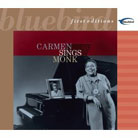 Ah yes, the late
jazz diva Carmen McRae at her absolute best, singing the songs of good friend Thelonious
Monk -- well, his music, others' words. This disc offers a plethora of sonic details to
tantalize and astound. There are actually two different recordings here. First, there are
a couple of live cuts that, if your system is up to it, will give you a true sense of what
the term "hall space" is all about. Second, most tracks here are studio cuts
that contrast nicely with the live tracks. Toss in vocals and instruments that offer both
a realistic sense of size and tonal balance and you darn near have a complete seven-course
audiophile dinner right here. McRae was on during both sessions, the more so as
Monk himself had just passed away as this recording was being released. If all that I've
said isn’t enough to get you to pick up a copy of this CD, there is the original
vinyl version -- alas, available now only on the used market -- that blows the digital out
of the water. And, tee hee, I have both....John Crossett
Ah yes, the late
jazz diva Carmen McRae at her absolute best, singing the songs of good friend Thelonious
Monk -- well, his music, others' words. This disc offers a plethora of sonic details to
tantalize and astound. There are actually two different recordings here. First, there are
a couple of live cuts that, if your system is up to it, will give you a true sense of what
the term "hall space" is all about. Second, most tracks here are studio cuts
that contrast nicely with the live tracks. Toss in vocals and instruments that offer both
a realistic sense of size and tonal balance and you darn near have a complete seven-course
audiophile dinner right here. McRae was on during both sessions, the more so as
Monk himself had just passed away as this recording was being released. If all that I've
said isn’t enough to get you to pick up a copy of this CD, there is the original
vinyl version -- alas, available now only on the used market -- that blows the digital out
of the water. And, tee hee, I have both....John Crossett
Orff: Carmina Burana
St. Louis Symphony & Chorus; St. Louis Children’s Choir, John Aler; Hakan
Hagegard; Sylvia McNair; Leonard Slatkin, conducting
RCA Victor Red Seal 09026-61673
Format: CD
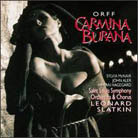 The Gladiator
soundtrack is getting a lot of play these days on big systems. Jeff Fritz is right --
it’s big, it’s exciting, and it’s bombastic. Problem is that it’s also
too repetitious for me. And while it does have great dynamic range, the problem I have is
that the journey through the hills and valleys is just too laborious and too long. If you
agree, I highly suggest a copy of Carl Orff’s Carmina Burana. Want to test the
macrodynamic range of your system? This one’s a roller-coaster ride. And
don’t be afraid to turn it up either. This piece is performed live by a fortified
symphony orchestra that is so large that most stages are barely large enough to contain
all the musicians. Do you want to know how your system handles solo vocalists? This
disc’s got three of them: baritone, tenor and soprano. Want to know if your system
can sort out the voices in a massed chorus? This is your disc. If you’re looking to
hear just how well your system can resolve the recorded venue, this disc has a great hall
sound just waiting to be deciphered. Bass, highs and everything in between -- this disc
has it. Great sonics and great music, it just doesn’t get much better than
this one....John Potis
The Gladiator
soundtrack is getting a lot of play these days on big systems. Jeff Fritz is right --
it’s big, it’s exciting, and it’s bombastic. Problem is that it’s also
too repetitious for me. And while it does have great dynamic range, the problem I have is
that the journey through the hills and valleys is just too laborious and too long. If you
agree, I highly suggest a copy of Carl Orff’s Carmina Burana. Want to test the
macrodynamic range of your system? This one’s a roller-coaster ride. And
don’t be afraid to turn it up either. This piece is performed live by a fortified
symphony orchestra that is so large that most stages are barely large enough to contain
all the musicians. Do you want to know how your system handles solo vocalists? This
disc’s got three of them: baritone, tenor and soprano. Want to know if your system
can sort out the voices in a massed chorus? This is your disc. If you’re looking to
hear just how well your system can resolve the recorded venue, this disc has a great hall
sound just waiting to be deciphered. Bass, highs and everything in between -- this disc
has it. Great sonics and great music, it just doesn’t get much better than
this one....John Potis
Keith Richards: Main Offender
Virgin Records VS-86499
Format: CD
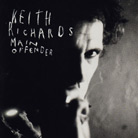 Main Offender,
Keith Richards' second solo album, is the most realistic-sounding rock recording I've ever
heard. The guitar work growls and sears, and the drumkit conveys the whack of stick on
skin and the kickdrum's quick impact. There's tremendous space -- width and depth galore
-- which is defined by the way each drum strike projects into the recording venue. If your
amps and neighbors are up to it, "Runnin' Too Deep" will communicate the sort of
raw power that characterizes live music. As the liner notes indicate, the material was
laid to tape in multiple studios, recorded and mixed by different engineers, and you can
easily tell the difference, which is another reason this CD is a reference: it clearly
illustrates the difference between very good and extraordinary sound....Marc Mickelson
Main Offender,
Keith Richards' second solo album, is the most realistic-sounding rock recording I've ever
heard. The guitar work growls and sears, and the drumkit conveys the whack of stick on
skin and the kickdrum's quick impact. There's tremendous space -- width and depth galore
-- which is defined by the way each drum strike projects into the recording venue. If your
amps and neighbors are up to it, "Runnin' Too Deep" will communicate the sort of
raw power that characterizes live music. As the liner notes indicate, the material was
laid to tape in multiple studios, recorded and mixed by different engineers, and you can
easily tell the difference, which is another reason this CD is a reference: it clearly
illustrates the difference between very good and extraordinary sound....Marc Mickelson
Sade: Lovers’ Rock
Epic EK 85185
Format: CD
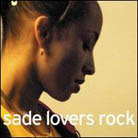 Ahhhh, Sade: the name
itself evokes a calm, almost serene feeling. I can’t imagine what I would do without
this disc. I think it has to be my true "desert island" disc. Released just last
year, I think it has to be Sade's strongest work to date. Sonics are solid, although in
the wrong system I could see that the very generous bass could be a bit much. It is
this very potential for disaster that makes this a handy disc to have around as it will
quickly help highlight troublesome bass performance or room-interaction problems. The
voices are generally well recorded; however, on a couple of tracks, Sade was perhaps a bit
too closely miked. My absolute favorite cut has to be "Somebody Already Broke my
Heart," which captures Sade’s vocals beautifully, and has some neat synthetic
phase effects that punctuate the chorus. The reggae-influenced "Slave Song" has
a way cool deep bass line running through it, and can present a challenge to sort out the
various backing vocals that parallel Sade. The highs are clean and typical of a decent
modern recording; however, they won’t win any awards for absolute transparency up
top. This disc sounds good on modest systems, even on my baby mini-system that serves as
my clock radio. But it becomes something truly wonderful and soulful when played on the
big rig....David Dowdell
Ahhhh, Sade: the name
itself evokes a calm, almost serene feeling. I can’t imagine what I would do without
this disc. I think it has to be my true "desert island" disc. Released just last
year, I think it has to be Sade's strongest work to date. Sonics are solid, although in
the wrong system I could see that the very generous bass could be a bit much. It is
this very potential for disaster that makes this a handy disc to have around as it will
quickly help highlight troublesome bass performance or room-interaction problems. The
voices are generally well recorded; however, on a couple of tracks, Sade was perhaps a bit
too closely miked. My absolute favorite cut has to be "Somebody Already Broke my
Heart," which captures Sade’s vocals beautifully, and has some neat synthetic
phase effects that punctuate the chorus. The reggae-influenced "Slave Song" has
a way cool deep bass line running through it, and can present a challenge to sort out the
various backing vocals that parallel Sade. The highs are clean and typical of a decent
modern recording; however, they won’t win any awards for absolute transparency up
top. This disc sounds good on modest systems, even on my baby mini-system that serves as
my clock radio. But it becomes something truly wonderful and soulful when played on the
big rig....David Dowdell
Ennio Morricone: The Mission
Soundtrack
Virgin 90567-2
Format: CD
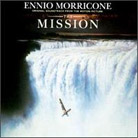 Ennio Morricone’s
wonderful film score is reason enough to own this album. At first I thought it to be an
only so-so recording, not suitable for use when evaluating components, but I’ve
learned that with each system improvement, there’s more and more musical information
to be found, proving to me that you don’t need pristinely recorded music to make
value judgments about a system. So, in the 15 years that I’ve owned this exact
disc, I’ve come to use it as a reference for judging overall resolution of components
and for determining their ability to extract and delineate minute detail. For example,
many of the tracks are of a large chorus. On lesser systems, these blend into a large wall
of sound. As system resolution increases, so does the delineation of individual voices in
the choir. In fact, with the improvement of CD players in the past couple years, I feel I
am only now hearing close to all of what’s on here. This disc also makes for a
worthwhile test of depth of stage. On certain tracks, the expanse and breadth of voices
makes for a potentially enormous soundstage within your listening room.…Doug
Schneider
Ennio Morricone’s
wonderful film score is reason enough to own this album. At first I thought it to be an
only so-so recording, not suitable for use when evaluating components, but I’ve
learned that with each system improvement, there’s more and more musical information
to be found, proving to me that you don’t need pristinely recorded music to make
value judgments about a system. So, in the 15 years that I’ve owned this exact
disc, I’ve come to use it as a reference for judging overall resolution of components
and for determining their ability to extract and delineate minute detail. For example,
many of the tracks are of a large chorus. On lesser systems, these blend into a large wall
of sound. As system resolution increases, so does the delineation of individual voices in
the choir. In fact, with the improvement of CD players in the past couple years, I feel I
am only now hearing close to all of what’s on here. This disc also makes for a
worthwhile test of depth of stage. On certain tracks, the expanse and breadth of voices
makes for a potentially enormous soundstage within your listening room.…Doug
Schneider
Percussion Demo and System
Conditioning Disc
Encore Performance Recordings EPR-2524
Format: CD
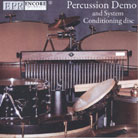 Well-recorded percussion
instruments can present an extreme workout for a hi-fi system, which makes recordings of
them very useful in assessing system performance. A good percussion recording tests high
frequencies, low frequencies, dynamics, and timbral accuracy. At the Rocky Mountain Audio
Fest 2006, I experienced a demonstration of a recording of percussion instruments that
was, by a wide margin, the most realistic I’ve ever heard. Recordist Ron Meyer used
his proprietary Acoustic Pressure Wave recording system to capture an unidentified
percussionist playing nine solo tracks on a variety of instruments. There are four tracks
of a standard drum set playing jazz and rock pieces, two tracks of random percussion
instruments, two tracks of military march cadence, and one track of hand-clapping and
foot-stomping. Although there’s not much musical value in these tracks, the recording
is designed to stress your system. I especially like the two tracks of the random
percussion instruments, which utilize a wide variety of instruments that span the
frequency spectrum and have startling dynamic impact. If your system plays this recording
well, it’s very respectable indeed. Meyer also suggests using the recording to
condition your system to reveal more detail and dynamics. The recording is available from:
Well-recorded percussion
instruments can present an extreme workout for a hi-fi system, which makes recordings of
them very useful in assessing system performance. A good percussion recording tests high
frequencies, low frequencies, dynamics, and timbral accuracy. At the Rocky Mountain Audio
Fest 2006, I experienced a demonstration of a recording of percussion instruments that
was, by a wide margin, the most realistic I’ve ever heard. Recordist Ron Meyer used
his proprietary Acoustic Pressure Wave recording system to capture an unidentified
percussionist playing nine solo tracks on a variety of instruments. There are four tracks
of a standard drum set playing jazz and rock pieces, two tracks of random percussion
instruments, two tracks of military march cadence, and one track of hand-clapping and
foot-stomping. Although there’s not much musical value in these tracks, the recording
is designed to stress your system. I especially like the two tracks of the random
percussion instruments, which utilize a wide variety of instruments that span the
frequency spectrum and have startling dynamic impact. If your system plays this recording
well, it’s very respectable indeed. Meyer also suggests using the recording to
condition your system to reveal more detail and dynamics. The recording is available from:
Ron Meyer Recordings
5002 Copperhill Circle
Parker, TX 75002
www.eprgoldcds.com
.…Vade Forrester
Rebecca Pidgeon: The Raven
Chesky JD115
Format: CD
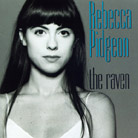 The Raven is a CD I
have come to trust for assessing the vocal presentation of a system. I think its best
attribute is simply that it is naturally recorded. The tonality, scaling, and ambiance
combine to make a simple, yet complete presentation. There is none of the hyper-realism
you sometimes hear on "audiophile" recordings -- the image is not ten feet wide,
and you don’t hear breath on your face from 12 feet away. The lack of contrived
processing makes it sound very close to real, which is why it is a must for your
arsenal. As for individual tracks, "Spanish Harlem" is probably the most
popular, but I like "You Got Me" and "Seven Hours."…Jeff
Fritz
The Raven is a CD I
have come to trust for assessing the vocal presentation of a system. I think its best
attribute is simply that it is naturally recorded. The tonality, scaling, and ambiance
combine to make a simple, yet complete presentation. There is none of the hyper-realism
you sometimes hear on "audiophile" recordings -- the image is not ten feet wide,
and you don’t hear breath on your face from 12 feet away. The lack of contrived
processing makes it sound very close to real, which is why it is a must for your
arsenal. As for individual tracks, "Spanish Harlem" is probably the most
popular, but I like "You Got Me" and "Seven Hours."…Jeff
Fritz
Robbie Robertson & The Red Road
Ensemble: Music for the Native Americans
Capitol C2 724382829522
Format: CD
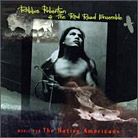 This Robbie
Robertson offering from 1994 is a combination of both acoustic and synthesized native
rhythms, percussion, and songs along with Robertson’s distinctive vocals and guitar
work. The richly textured instrumentation blends with ethereal vocals and
reference-quality bass that will test both the quantity and accuracy of bass that a system
can reproduce. Lesser components will have difficulty in sorting out the complex passages
that will tend to blend together into one homogenous image. Tracks such as "Coyote
Dance" and "Mahk Jchi" will open up with tremendous air and space around
the instruments and image outside of the speakers when played back on better systems. The
vocals on "Akua Tuta" and "Mahk Jchi" will also be placed precisely in
the soundstage with good depth on such systems. "Vanishing Breed" is perhaps the
most telling track, with intertwining instrumental lines and a recording of a flute that
is a demanding and dynamic test of the midrange.…Roger Kanno
This Robbie
Robertson offering from 1994 is a combination of both acoustic and synthesized native
rhythms, percussion, and songs along with Robertson’s distinctive vocals and guitar
work. The richly textured instrumentation blends with ethereal vocals and
reference-quality bass that will test both the quantity and accuracy of bass that a system
can reproduce. Lesser components will have difficulty in sorting out the complex passages
that will tend to blend together into one homogenous image. Tracks such as "Coyote
Dance" and "Mahk Jchi" will open up with tremendous air and space around
the instruments and image outside of the speakers when played back on better systems. The
vocals on "Akua Tuta" and "Mahk Jchi" will also be placed precisely in
the soundstage with good depth on such systems. "Vanishing Breed" is perhaps the
most telling track, with intertwining instrumental lines and a recording of a flute that
is a demanding and dynamic test of the midrange.…Roger Kanno
Jordi Savall: La Folia, 1490-1701
Alia Vox AAFA 9805 (CD), FSA 9805 (SACD)
Formats : CD and SACD
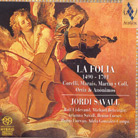 This recording comprises
different settings of and variations on the dance tune "La Folia," which
originated in Portugal in the 15th century. Played on period instruments by noted
scholar/performer Jordi Savall and a group of six other instrumentalists, the pieces on
this recording are lively and stylish, and you can tell the players had a rollicking good
time performing them. The most famous piece is probably Arcangelo Corelli’s set of
variations on "La Folia," written in 1700. But the piece that occupies pride of
place on my CD is the first track, titled "Rodrigo Martinez." With its
"harmonic and formal structure" based on the "La Folia" tune (which
itself doesn’t appear), the piece forms a hi-fi spectacular. Starting with the
cascabels (sleigh bells) being struck in a very reverberant space, the tune first appears
on guitar, is picked up by triple harp, and then stated by Savall on his tenor viola da
gamba. Besides wooden castanets, percussion is provided by what sounds like a large drum
with loose heads, which can give your woofers a real workout. The musicians obviously have
a blast as they interweave their differing versions of the melody together. Savall’s
enjoyment of the result is evident from the way he hums along with the music. On a poor
system, the piece sounds like a jumble of notes, but on a good one, the contribution of
each musician intertwines with the others to form a part of the overall piece.
"Rodrigo Martinez" is a very complex piece, but one I never tire of hearing. The
SACD version is smoother and less grainy, but not much more transparent....Vade
Forrester
This recording comprises
different settings of and variations on the dance tune "La Folia," which
originated in Portugal in the 15th century. Played on period instruments by noted
scholar/performer Jordi Savall and a group of six other instrumentalists, the pieces on
this recording are lively and stylish, and you can tell the players had a rollicking good
time performing them. The most famous piece is probably Arcangelo Corelli’s set of
variations on "La Folia," written in 1700. But the piece that occupies pride of
place on my CD is the first track, titled "Rodrigo Martinez." With its
"harmonic and formal structure" based on the "La Folia" tune (which
itself doesn’t appear), the piece forms a hi-fi spectacular. Starting with the
cascabels (sleigh bells) being struck in a very reverberant space, the tune first appears
on guitar, is picked up by triple harp, and then stated by Savall on his tenor viola da
gamba. Besides wooden castanets, percussion is provided by what sounds like a large drum
with loose heads, which can give your woofers a real workout. The musicians obviously have
a blast as they interweave their differing versions of the melody together. Savall’s
enjoyment of the result is evident from the way he hums along with the music. On a poor
system, the piece sounds like a jumble of notes, but on a good one, the contribution of
each musician intertwines with the others to form a part of the overall piece.
"Rodrigo Martinez" is a very complex piece, but one I never tire of hearing. The
SACD version is smoother and less grainy, but not much more transparent....Vade
Forrester
Ravi Shankar, Chatur Lal, N.C. Mullick: The
Sounds of India. An Introduction to Indian Music
Columbia Records CL2496
Format: LP
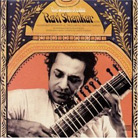 In my feeble attempt to feed
starving musicians all over the world, I make a point of purchasing at least a couple of
recent international releases every few months. Some great music has come about as a
result of joint projects between Western and Eastern musicians. One such (mono) recording
happened when, upon invitation from the Voice of America, Ravi Shankar, the Indian master
of classical sitar, visited New York and made his first album in 1950. This was the era
before the Beatles traveled to India and brought back the sounds of the sitar and tabla to
an unfamiliar West.
In my feeble attempt to feed
starving musicians all over the world, I make a point of purchasing at least a couple of
recent international releases every few months. Some great music has come about as a
result of joint projects between Western and Eastern musicians. One such (mono) recording
happened when, upon invitation from the Voice of America, Ravi Shankar, the Indian master
of classical sitar, visited New York and made his first album in 1950. This was the era
before the Beatles traveled to India and brought back the sounds of the sitar and tabla to
an unfamiliar West.
This LP is an excellent resource with which to
set up a turntable. A good system should portray a wide soundstage and clearly separate
the varying pitch of the sitar -- its 20 metal frets, six main strings, and 19 resonating
strings in all. Passages throughout this album push the high frequencies to their limits,
and the accompanying tabla does an excellent job in gauging the accuracy of a
component’s midbass and lower midrange. The tabla, like the bongos, is played
by hand, and the right system should portray its sweet, rhythmic sound with all the
immediacy and attack of any drum kit. Again, the music on this album is Eastern in nature,
but it is a great resource for determining system coherency and palpability in any part of
the world.…Mack Khan
Turtle Creek Chorale: Psalms
Reference Recordings RR-86CD
Format: CD
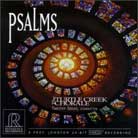 The human voice
is the ultimate instrument. A great chorus is like a fine symphony. One of the best
recordings that proves this is the Turtle Creek Chorale’s Psalms. If you want
a disc for testing soundstage depth and width, I know of none better. On tracks such as
"It Is a Good Thing to Give Thanks" or my favorite, "The Secret
Place," the chorus appears to reach beyond my living-room wall and into the
neighbor’s yard. Turning the lights out, I feel as if my room has been stretched into
cathedral-like proportions. The accompanying instruments make fine test material as well.
On track 8, a pipe organ improvisation sweeps the extremes, letting you find out how low
those woofers really go. Imaging of both voices and instruments is top notch. There are
over a hundred singers here, and you can still pick out individual voices. If you’ve
never been fond of choral music, this might be a good place to start....Bill Brooks
The human voice
is the ultimate instrument. A great chorus is like a fine symphony. One of the best
recordings that proves this is the Turtle Creek Chorale’s Psalms. If you want
a disc for testing soundstage depth and width, I know of none better. On tracks such as
"It Is a Good Thing to Give Thanks" or my favorite, "The Secret
Place," the chorus appears to reach beyond my living-room wall and into the
neighbor’s yard. Turning the lights out, I feel as if my room has been stretched into
cathedral-like proportions. The accompanying instruments make fine test material as well.
On track 8, a pipe organ improvisation sweeps the extremes, letting you find out how low
those woofers really go. Imaging of both voices and instruments is top notch. There are
over a hundred singers here, and you can still pick out individual voices. If you’ve
never been fond of choral music, this might be a good place to start....Bill Brooks
Roger Waters: Amused To Death
Columbia CK 47127
Format: CD
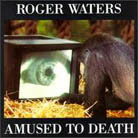 Not only is this a
great-sounding disc that you can use to evaluate a system, it’s a fantastic disc with
which to impress your friends too. Steely screaming guitars, synthesized vocals that test
the bass performance of almost any system, explosions, Pink Floyd-type sound effects, all
are rendered in QSound, a surround format designed to work through two speakers. QSound
works phenomenally well at placing sounds above and all around you, even out to the
extreme eight and four o’clock positions. That’s right -- out and to the side of
you and slightly behind you -- if your system is up to it. The key is that your
system must be set up extraordinarily well and the speakers must be positioned precisely
with no asymmetry and no problems with early reflections that will destroy the phase and
timing cues required to make QSound work. As it is with at least 85% of the systems
I’ve set up, once you get the room and speakers arranged so that this disc images the
way it should, the system will sound its best on everything else too. Conversely, if your
system doesn’t image as I’ve described, it’s probably not doing justice to
everything else either. So turn off the lights, fire up this disc and let me warn you now;
that dog you hear in the next door neighbor’s yard is not really out there; he’s
coming from your system and your system must be rockin'....John Potis
Not only is this a
great-sounding disc that you can use to evaluate a system, it’s a fantastic disc with
which to impress your friends too. Steely screaming guitars, synthesized vocals that test
the bass performance of almost any system, explosions, Pink Floyd-type sound effects, all
are rendered in QSound, a surround format designed to work through two speakers. QSound
works phenomenally well at placing sounds above and all around you, even out to the
extreme eight and four o’clock positions. That’s right -- out and to the side of
you and slightly behind you -- if your system is up to it. The key is that your
system must be set up extraordinarily well and the speakers must be positioned precisely
with no asymmetry and no problems with early reflections that will destroy the phase and
timing cues required to make QSound work. As it is with at least 85% of the systems
I’ve set up, once you get the room and speakers arranged so that this disc images the
way it should, the system will sound its best on everything else too. Conversely, if your
system doesn’t image as I’ve described, it’s probably not doing justice to
everything else either. So turn off the lights, fire up this disc and let me warn you now;
that dog you hear in the next door neighbor’s yard is not really out there; he’s
coming from your system and your system must be rockin'....John Potis
Hans Zimmer: Gladiator Soundtrack
Decca 289 467 094-2
Format: CD
 Gladiator is the test for dynamics, frequency response, soundstage
depth and scale, and complex material presentation. The recording is just fantastic as it
has all the attributes you listen for: it’s clean and uncompressed with super-low
bass and delicate high frequencies. "The Battle" will easily test the attack and
decay capabilities of even the most serious systems. It is full scale plus! This is one CD
to take with you when auditioning speakers. Beyond the high fidelity, though, this CD will
take you on an emotional roller coaster that can become addicting. Turn the lights out,
turn up the volume, and presto, you’re in Rome, unleashing hell on the enemy.
Cool….Jeff Fritz
Gladiator is the test for dynamics, frequency response, soundstage
depth and scale, and complex material presentation. The recording is just fantastic as it
has all the attributes you listen for: it’s clean and uncompressed with super-low
bass and delicate high frequencies. "The Battle" will easily test the attack and
decay capabilities of even the most serious systems. It is full scale plus! This is one CD
to take with you when auditioning speakers. Beyond the high fidelity, though, this CD will
take you on an emotional roller coaster that can become addicting. Turn the lights out,
turn up the volume, and presto, you’re in Rome, unleashing hell on the enemy.
Cool….Jeff Fritz